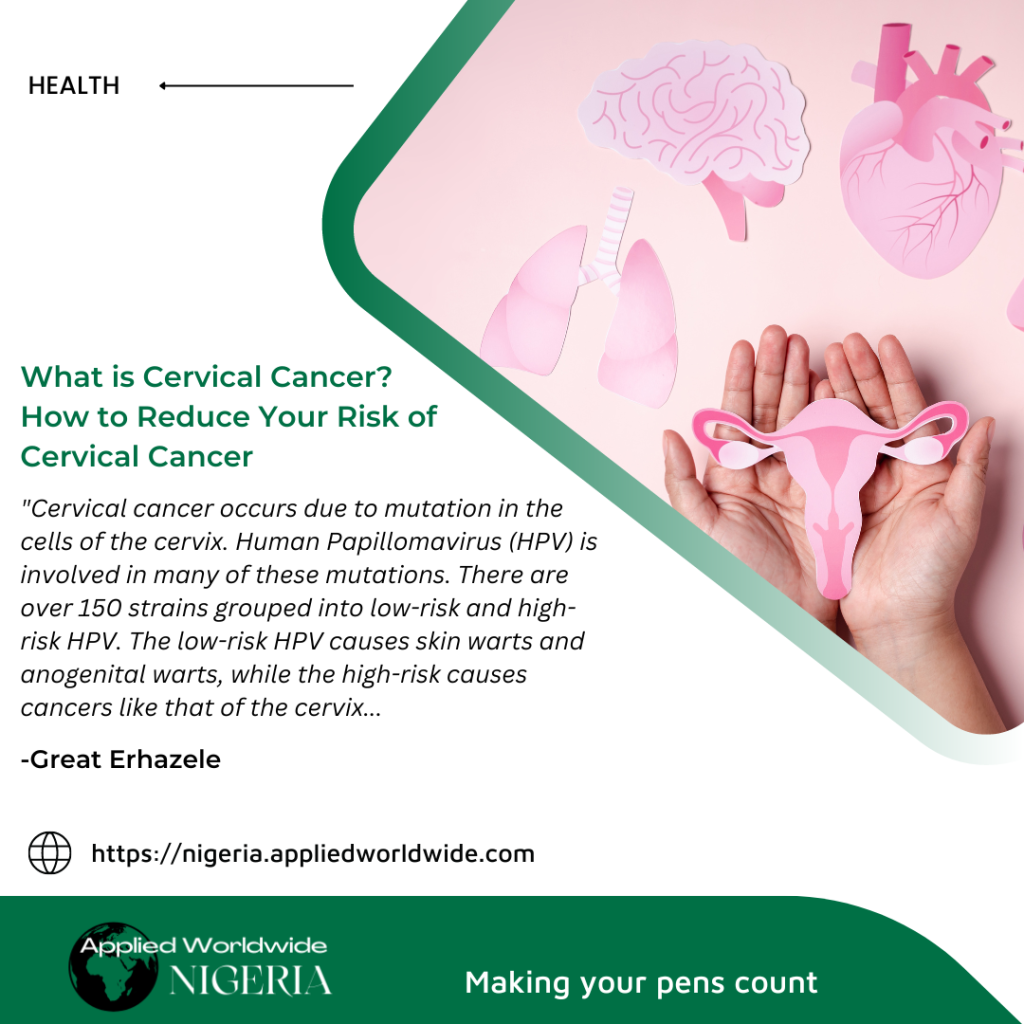What is cervical cancer?
Cervical cancer is one of the few preventable cancers that exist, it is also curable. In this article, you’ll find relevant information about the disease – the cause, risk factors, and symptoms. Armed with this, you will know what signs to look out for, and what habits to change, so you can live a long, healthy life.
Medically reviewed by Dr. Qudus Lawal (MBBS, FWACS, Consultant Specialist, Obstetrics and Gynecology)
Key takeaways:
● What cervical cancer is |
● What causes cervical cancer |
● The risk factors of cervical cancer |
● The symptoms of cervical cancer |
● How to reduce your risk of cervical cancer |

Cancers occur when abnormal cells in the body begin to divide uncontrollably. Cells normally multiply by a series of divisions that are tightly regulated. In cancer, this regulatory mechanism is lost.
Breast cancer and Cervical cancer are three malignancies that affect women.
What is Cervical cancer?
Cervical cancer is a type of cancer occurring in the cervix – the cervix is the lowermost part of the female uterus which ends in the vagina. This disease ranks as the second most common cancer affecting women in Nigeria and is the second leading cause of cancer-related deaths among women between the ages of 15 and 44 years. WHO data put the number of deaths at 7,968 in 2020 alone.
What causes Cervical cancer?
Cervical cancer occurs due to mutation in the cells of the cervix. Human Papillomavirus (HPV) is involved in many of these mutations. There are over 150 strains grouped into low-risk and high-risk HPV. The low-risk HPV causes skin warts and anogenital warts, while the high-risk causes cancers like that of the cervix, vulva, vagina, penis, anus, mouth, and throat. It can be transmitted during sex, so most people who are sexually active will have the infection at some point in their life, but the majority of infections are self-limiting. Persistent HPV infection leads to precancerous changes in the cervix, and if not treated will ultimately end in cancer.
In addition to HPV infection, other factors make you vulnerable to cervical cancer.
What are the risk factors of Cervical cancer?
● Having multiple male sexual partners.
● Being with a high-risk male partner, that is someone with multiple sexual partners, asymptomatic HPV infection, and an unresolved genital ulcer.
● Genital herpes, chlamydia infection, syphilis, or other genital infections.
● Weakened immunity like a chronic condition, or from the use of immunosuppressive drugs.
● Smoking.
● Pregnancy history, the risk of cervical cancer increases with high multiparity.
● Oral contraceptives use.
● Lack of cervical cancer screening services.
● Low socioeconomic class.
● The genetics and family history.
● High fatty diet.
What are the symptoms of Cervical cancer?
Symptoms vary for different women, they include;
● Abnormal vaginal bleeding – occurring during sex, in between periods, or after menopause.
● Abnormal vagina discharge – which can be watery or bloody, with a foul smell.
● Pain that is felt around the pelvic region.
● Pain during sex.
● Diarrhea or constipation – due to the extension of the disease to the pelvic colon.
● Bloody urine, a symptom called hematuria. It occurs when the cancer cells infiltrate the bladder.
● Involuntary discharge of urine or feces, which is also referred to as urinary or fecal incontinence.
● Edema of the lower extremities – which happens when the cancer cells infiltrate and block lymphatic channels.
● Significant weight loss.
● Kidney failure from cancer spread to the ureters.
How to reduce your risk of Cervical cancer?
Cervical cancer is highly preventable, and compared to some cancers, has various options for screening. When the disease is caught early, it is also easier to manage. Some of the ways you can lower your risks of cervical cancer include;
● Get vaccinated:
HPV is involved in over 80% of cervical cancer and there are vaccines for it. Gardasil-9 and Cervarix for example, protect you against the virus, so it is wise to get vaccinated. You will need a series of 2 or 3 shots to get the desired immunity and can commence the vaccination from 9-12 years. Discuss with your healthcare provider where and how you can get vaccinated.
● Regular pap smear:
The Papanicolaou test (pap smear) is the screening test for cervical cancer. The test shows any changes in the cervix that points to cervical cancer, and it is available for all women, even when you have been vaccinated against HPV. There are also tests for the presence of HPV infections. You should discuss with your healthcare provider about scheduling regular pap tests.
● Avoid unprotected sex:
Unprotected sex is an important transmission mechanism for HPV infection. Consider sticking to a faithful partner, being faithful, and using protection to avoid contracting the virus.
● Quit smoking and drinking:
Cigarettes and other tobacco products make the cervix susceptible to HPV infection. Excess alcohol intake also increases your risk of cervical cancer. Now is a good time to quit smoking and excess drinking. Discuss with your doctor the way to go about it.
● Judiciously consider birth control:
While combined oral contraceptives may marginally increase your risk of cervical cancer, the incorporation of regular screening obviates this risk. Discuss with your doctor about the necessary steps forward.
● Treat all sexually transmitted infections:
This is important as other sexually transmitted infections increase your risk of contracting HPV infection.
● Eat healthy meals and exercise regularly:
A diet rich in vegetables, and fibers rich in legumes, fruits, and whole grains. Avoid a high-fat diet like food rich in red meat, whole-fat dairy products, and processed sugars. Exercise regularly to lose excess fats and build immunity.
Cervical cancer, like other cancers, is devastating. Unlike other cancers, it is preventable, and curable when detected early. Get ahead of this disease, get vaccinated, and go for regular cervical screening. Share this message with your loved ones, and stay healthy.






